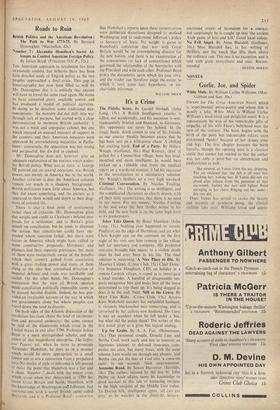Roads to Ruin
Number. 7 : Alexander Hamilton's Secret At- tempts to Control American For;:ign Policy.
By Julian Boyd. (PrincetonIO.U.P.,.32s.) TitE.Ainerican approach to revolution has been intensively .studied, but hitherto.there has been little detailed study of Eng:tsh ,policy as the two peoples approached a final crisis. This gap in historiography. has now been filled so well by Mr. Donoughue that it is unlikely that anyone will have to.travel the same road again. He seems to have consulted ,every available source and has produced a 'model of political narrative. In doing so he dissolves some traditional mis- conceptions: the ministry did not drift into war through lack of purpcise, but started with a clear determination to maintain British authority; it was not a weak and unpopular cabinet, but one which enjoyed an unusual measure of support in the country, and their American measures were approved by.overwhelming majorities in Parlia- ment: conversely. the opposition was not strong and purposeful, but divided in counsel.
Mr. Donoughue does not, however, give an adequate explanation of the motives which under- lay British policy. What was at stake. as George 111 pointed put on several occasions, ii:is British Power, not merely in America but in the world. Another criticism is that the American colonies remain too much in a shadowy background: British politicians knew little about America, but they did know something, and the picture as it appeared. to them would add depth to their diag- nosis of colonial ills.
There. is also a final point of controversy rather than of criticism. Mr. Donoughue gives due weight and credit to Chatham's belated pro- posals for a settlement, and to -Burke's great speech on conciliation, but he tends to discount the notion that conciliation could have suc- ceeded where coercion failed; but there were forces in America which might have rallied to some constructive proposals.. Merchants and Planters had their separate grievances, but most of them were instinctively aware of the benefits which their country gained from association with a great trading power and many of them Clung to the idea that centralised direction of imperial defence and trade was justifiable and useful. On the other hand, Mr. Donoughue's contention that the state of British opinion made conciliation politically .impossible seems to be proved beyond' dispute. Indeed, he has pro- vided an invaluable account of the way in which not governments alone but whole peoples can travel down the road to disaster.
On both sides of the Atlantic discussion of the revolution has risen above the level of recrimina- tion and personal animosity; the same cannot be said of the dissensions which arose in the United States in and after 1790. Professor Julian Boyd is a most distinguished scholar, and the editor of that magnificent enterprise, The leger7 ' Aon Papers; yet, when he turns to prosecute Alexander Hamilton, he does so in a manner which would be more appropriate to a small lawyer out to win a conviction from a prejudiced jury. No device of style or inference is left unused to make the point that Hamilton was a liar and ' a cheat. Number 7 deals with the minor crisis which arose when war threatened in 1790 be- tiieen Great Britain and Spain; Hamilton, with the knowledge of Washington and Jefferson, had conversations with a secret British agent called Beckwith, and it is Professor Boyd's contention that Hamilton's reports upon these conversations were deliberate distortions designed to mislead Washington and to undermine Jefferson's policy as Secretary of. State. No weight is given to Hamilton's conviction that war with Great Britain would be an overwhelming disaster for the new nation, and there is no examination of the conventions (or lack of conventions) which governed.the relationship of the Secretaries with the President and with each other. Professor Boyd prints the documents upon which his case rests, and the reader can therefore judge the extent to which it rests upon fact, hypothesis, or un- charitable inference.
WILLIAM BROCK






























 Previous page
Previous page